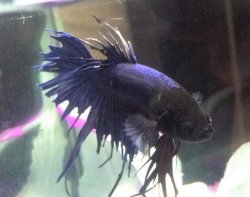With those new pics -- the pic of the close up of his dorsal fin is nice. His fins appear very healthy except for the ragged edges, broken rays(spines), and that one spot. The ragged edges and broken rays(spines) could be explained with fin biting. The spot however is still an oddity. At this point, I would just observe it and see what happens with it. It could be the start of a tumor or it could be something different. I am pretty sure it is not fungus as true fungus is rare and it doesn't really appear fuzzy just off colored. The white streaking in the anal fin is just coloring. Bettas (especially ones with the marble gene) tend to change color sometimes very dramatically.
New growth appears first as clear fin and the color starts to appear a little later. The smokey area in question looks more like coloring than the melted look I am meaning. I have included a pic of a betta with very advanced fin rot that is almost to the body in the dorsal fin. If you look at the very top ray(spine) you will see what I am talking about when I think of a fin that is melting.
As for your current situation, it is up to you which tank you want to put him in. IMO he is not bad off so should be able to go back to his previous tank if you want. However if you leave him in the 3 gallon, you will be able to monitor him for a while longer with a bit more ease. If you keep him in the unfiltered 3 gallon, 50% water changes every other day would be perfectly fine. Salt is one of those things that is up to each owner. It is something that most of the show breeders keep in their tanks all the time to keep parasites like ICH and velvet at bay and to help keep fish with wounds from developing infections. 1 tablespoon of salt(not epsom) per 5 gallons of water is a very low dose but is sufficient for the purposes I listed. Some people do not believe in adding salt so you are going to get differing opinions on if you should or shouldn't keep it in the tank.
As far as medication, I would give him no less than a 2 week break since he has been medicated with so many different things lately. If his fins get way worse (like the betta in the pic I post) then more medication may be necessary but for now I don't see any reason to continue adding stuff that actually might make things worse by stressing him.
Just FYI water changes will not kill your betta. 100% water changes daily will also not kill your betta.
*the betta in the pic is a crowntail which naturally has spiky fins so not all of this is fin rot damage. Notice the dorsal fin with the "bare" rays and the anal fin.
New growth appears first as clear fin and the color starts to appear a little later. The smokey area in question looks more like coloring than the melted look I am meaning. I have included a pic of a betta with very advanced fin rot that is almost to the body in the dorsal fin. If you look at the very top ray(spine) you will see what I am talking about when I think of a fin that is melting.
As for your current situation, it is up to you which tank you want to put him in. IMO he is not bad off so should be able to go back to his previous tank if you want. However if you leave him in the 3 gallon, you will be able to monitor him for a while longer with a bit more ease. If you keep him in the unfiltered 3 gallon, 50% water changes every other day would be perfectly fine. Salt is one of those things that is up to each owner. It is something that most of the show breeders keep in their tanks all the time to keep parasites like ICH and velvet at bay and to help keep fish with wounds from developing infections. 1 tablespoon of salt(not epsom) per 5 gallons of water is a very low dose but is sufficient for the purposes I listed. Some people do not believe in adding salt so you are going to get differing opinions on if you should or shouldn't keep it in the tank.
As far as medication, I would give him no less than a 2 week break since he has been medicated with so many different things lately. If his fins get way worse (like the betta in the pic I post) then more medication may be necessary but for now I don't see any reason to continue adding stuff that actually might make things worse by stressing him.
Just FYI water changes will not kill your betta. 100% water changes daily will also not kill your betta.
*the betta in the pic is a crowntail which naturally has spiky fins so not all of this is fin rot damage. Notice the dorsal fin with the "bare" rays and the anal fin.


